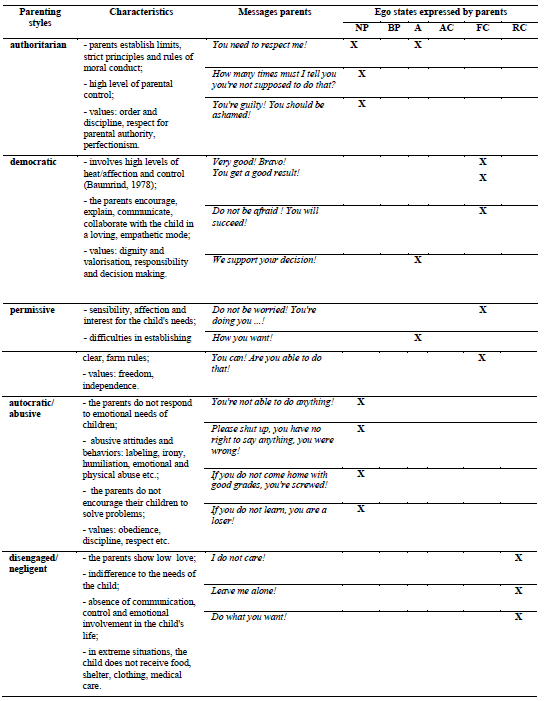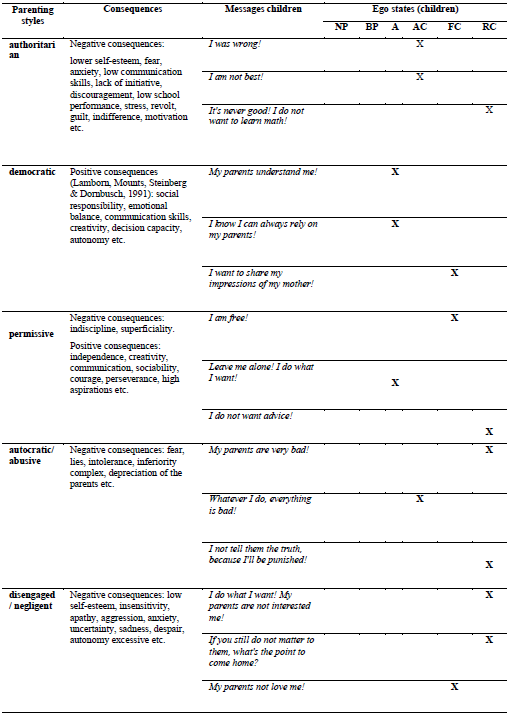Abstract
This study presents an approach of parenting styles from the perspective of transactional analyze. Based on the theoretical system developed by psychologist Eric Berne (1961), transactional analyze (TA) as experiential approach modern counseling and psychotherapy, was conceived as a means of development and personal evolution to improve communication, of interrelation. Transactional analyze identifies how the social environment, especially family, school, and, more recently, media, influences the formation of particular patterns of communication and interrelation, with positive/negative effects, personal and social. The theoretical study reveals the correlations between the different parenting styles and states of ego expressed by parents in their relationships with the children and their effects in terms of developing condition of Ego responsible for certain emotions, beliefs and behaviors of children and adolescents (Normative Parent, Benevolent Parent, Adult, Free Child, Adapted Child, Rebel Child). We believe that for parents and counselors/psychotherapists this analysis is useful. The adoption a correct parenting style is essential for the harmonious development of children's personality.
Keywords: Transactional Analyze (TA)parenting styleEgo statesParent EgoAdult EgoChild Ego
Introduction
The family is one of the oldest social constructions in ensuring continuity and affirmation of the
human species. It is the most relevant socio-affective background for the formation and evolution of the
man. The evolution of family is conditioned by the values the society reflects at a certain historical stage:
axiomatic, scientific, political, economic, technological etc. The level of adaptation and social integration
of a person is directly dependent on acquisitions within the family group affiliation as the primary source
of learning, emotional support and security.
The modalities of expression and manifestation of feelings, beliefs, attitudes and behaviors of
parents in relationships with their children determine certain styles and create a certain emotional climate.
Synthesizing the papers which approach the parenting styles, we find that they are established according to two criteria:
a. authority/liberalism or constraint/tolerance;
b. love/hostility or attachment/rejection (Reuchlin, 1972; Kellerhals & Montandon, 1997, cf. Stănciulescu, 1997).
In this regard, the typology formulated by Diana Baumrind in 1973 is representative:
the child in a protective mode; low anxiety)
independently, the parents do not cooperate with the child, but offer positive feedback).
Another tiplogie elaborated by Clautier in 1996 it is based on two criteria (as cited in Stănciulescu,
1997):
low interest for child and his needs);
control);
The study of parental typologies helps parents or prospective parents to adopt a correct parental
style for harmonious evolution of their children (emotional, cognitive and behavioral). On that aspect
reflects different orientations modern psychological and pedagogical, with theoretical and methodological
impact on counseling and psychotherapy, but also on educational practice. That is
(TA) which identifies the role of social environment (family, school, and, more recently, media) in the
formation of patterns of communication and interrelation, with positive /negative consequences in
personal and social existence.
Based on the theoretical system developed by psychologist Eric Berne (
psychotherapy, was conceived as a means of development and personal evolution for to improve
communication and interpersonal relationships. Berne suggests structuring of personality in
states: Parent Ego, Adult Ego, Child Ego. Each person develops three Ego states. These including: rules
and behaviors, thoughts, judgments, emotions and feelings. The harmony and their proper updating of
situation is the sine qua non condition for our state well, child or adult (De Lassus, 2000).
In the transactional counseling, an important role is given to the development of
creative, original and unique component of person. The person is encouraged to trust in
express emotions and feelings, freely and spontaneously, to learn new permissions (ex: to find a large
number of additions to the phrase:
„Depending on the type of education in family and school, the three Ego states develops
harmoniously or disproportionate” (Băban, 2001, p. 63). By inadequate educational models and strategies
is hypertrophy one or another state. For example, the rigid, constraining education exacerbates the
Purpose of the study
This study presents an approach of parenting styles from the perspective of transactional analyze
(theoretical system developed by psychologist Eric Berne in 1961).The study proposes an analysis of
correlations between parenting styles and
children. Also, the study highlights the consequences of parenting styles on
Normativ Parent (NP), Benevolent Parent (BP), Adult (A), Adapted Child (AC), Free Child (FC), Rebel
Child (RC).
Their purpose this study is essentially understanding of human reality, the relationship between
educational style of parents and children's attitudes and behaviors in relationships with self and with
others. The adoption a correct parenting style is essential for the harmonious development of children's
personality.
Research methods
Our study is based on the method of descriptiv case study (Yin, 1994, as cited in Tellis, 1997).
This method allowed the identification of correlations between parenting styles and Ego states expressed
in parent-child communication. Also, we identified correlations between parenting styles and Ego states
that each generates to the child's personality.
Findings
The correlations between parenting styles and Ego states expressed in parent-child communication
- Normativ Parent (NP), Benevolent Parent (BP), Adult (A), Adapted Child (AC), Free Child (FC), Rebel

In the table below are described the parenting styles and Ego states of the child (Table 2):

Our study shows the relationship between parenting styles and Ego states expressed by attitudes
and parental behaviors. Also, the study shows the relationship between parenting styles and Ego states
generated at the child's personality: Normative Parent, Benevolent Parent, Adult, Adapted Child, Free
Child, Rebel Child. Thus, we can identify the following relational schemes:
1. Authoritarian parenting style (Normative Parent)⇒Adapted Child, Rebel Child, Normative
Parent.
2. Democratic parenting style (Adult, Benevolent Parent, Free Child) ⇒ Adult, Free Child,
Benevolent Parent.
3. Permissive parenting style (Benevolent Parent, Free Child, Adapted Child) ⇒ Adult, Free
Child, Rebel Child.
4. Abusive parenting style (Normative Parent, Rebel Child) ⇒ Adapted Child, Rebel Child.
5. Negligent parenting style (Rebel Child, Normative Parent) ⇒Rebel Child, Adapted Child, Free
Child.
Conclusions
However, this dates expresses a relative reality. Each family is unique, by its relations, by the
functions they performs, by communication, attitudes and behaviors. For this reason, the issuing of
general assertions is risky. We believe that for parents and counselors/psychotherapists this analysis is
useful. In sessions of psycho-pedagogical transactional counseling, the parents or future parents should
learn that the adoption a correct parenting style is essential for the harmonious development of children's
personality: cognitive, emotional and behavioral. Moreover, the whole dynamic of transactional
counseling is centered on learning, development and optimization.
References
- Baumrind, D. (1973). The development of instrumental competence through socialization. In A. Pick (Ed.), Minnesota Symposia on Child Development, 7, pp. 3-46, Minnesota: Univ. of Minnesota Press.
- Baumrind, D. (1978). Parental disciplinary patterns and social competence in children. Youth & Society,
- 9(3), 239-251.
- Băban, A. (coord.). (2001). Consiliere educaţională. Ghid metodologic pentru orele de dirigenţie şi
- consiliere. Cluj-Napoca: Editura Psinet.
- De Lassus, R. (2000). Analiza tranzacţională. Bucureşti: Editura Teora.
- Lamborn, S. D., Mounts, N. S., Steinberg, L., Dornbusch, S. M. (1991). Patterns of competence and adjustment among adolescents from authoritative, authoritarian, indulgent and neglectful families. Child development, 62, 1049-1065.
- Stănciulescu, E. (1997). Sociologia educaţiei familiale, I. Strategii educative ale familiilor contemporane.Iaşi: Editura Polirom.
- Tellis, W. (1997). Introduction to case study, The Qualitative Report, 3(2). htpp://www.nova.edu/sss/QR/QR3-2/tellis1.html.
Copyright information

This work is licensed under a Creative Commons Attribution-NonCommercial-NoDerivatives 4.0 International License.
About this article
Publication Date
25 May 2017
Article Doi
eBook ISBN
978-1-80296-022-8
Publisher
Future Academy
Volume
23
Print ISBN (optional)
-
Edition Number
1st Edition
Pages
1-2032
Subjects
Educational strategies, educational policy, organization of education, management of education, teacher, teacher training
Cite this article as:
Moraru, M. (2017). An Approach Of Parenting Styles From The Perspective Of Transactional Analyze. In E. Soare, & C. Langa (Eds.), Education Facing Contemporary World Issues, vol 23. European Proceedings of Social and Behavioural Sciences (pp. 932-937). Future Academy. https://doi.org/10.15405/epsbs.2017.05.02.114

